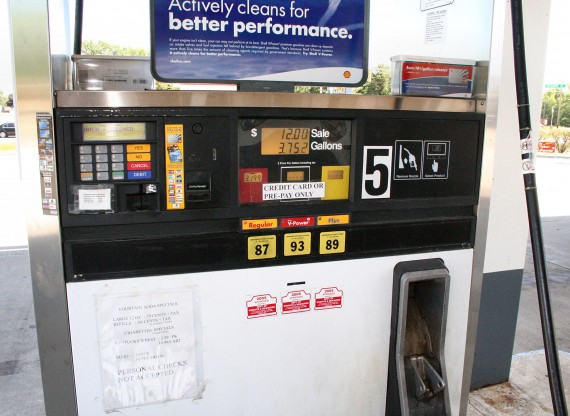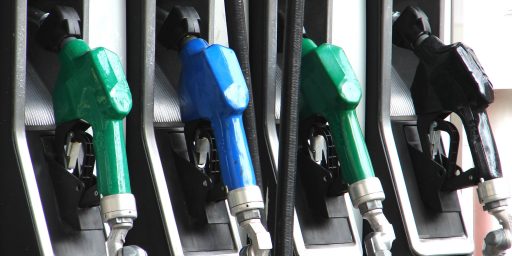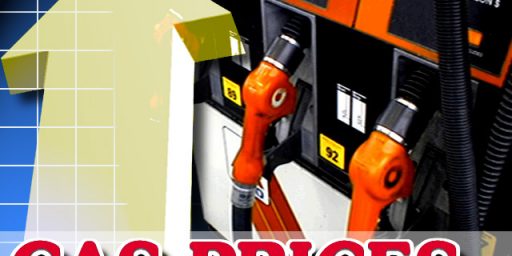Gas Prices Are Falling, But That’s Not Necessarily Good News
Gas prices are falling nationwide but that's mostly because the economy kind of stinks.
It was just a few months ago that we are all fearing the summer of $5.00/gallon gasoline, not it looks like we could see the summer of gas under $3.00/gallon but that’s not necessarily a sign that things are improving:
The darkening clouds of the slowing economy could provide a bright spot for consumers: gasoline at $3 a gallon — or less — by autumn.
Nationally, regular gasoline averages $3.47 a gallon, down 47 cents from this year’s high in April and well below the $5-a-gallon fears fanned earlier this year by energy speculators, Middle East tensions and oil refinery glitches that crimped supplies.
Those issues appear to be over, at least for now. Thursday, benchmark West Texas Intermediate crude oil fell 4% to $78.20 a barrel, the lowest price since early October and off 20% year-to-date. Coupled with slumping wholesale gasoline contracts for fall delivery, “the market is suggesting gas below $3 by Halloween, and certainly by Thanksgiving,” says Tom Kloza of the Oil Price Information Service.
With production up, oil inventories at 21-year highs and tepid consumer demand, gas prices have fallen for 11 weeks. They’re expected to drop more sharply after the peak summer driving season.
“Demand just isn’t there,” says Brian Milne of energy tracker Televent DTN, noting an Energy Departmentreport that demand for fuel over the past four weeks has fallen 5% below year-ago levels. “It’s been dreadful.
Barring supply disruptions heading into hurricane season — which helped drive pump prices to an all-time $4.11 high in July 2008 — consumers could soon be filling up at prices not seen since December 2010.
The expected slump in gas prices could have far-ranging impact, from consumer spending to the presidential elections, where debate over the swift price run-up early this year dominated much of the debate over which political party and energy policy could keep a lid on prices. Now, economists say plunging prices could provide a bit of a floor on the sputtering economy.
“You’re talking about roughly $114 billion in extra consumer spending power, and that’s a big deal if overall consumer spending is up 2% to 2.5% this year,” says Nigel Gault, chief U.S. economist at economic forecasters IHS Global Insight.
If nothing else, lower gas prices could act as an effectively counterbalance to the economic storms from overseas, thus shielding the United States from the worst of what looks a lot like a worldwide economic downturn. Whether it will be enough to actually have a significant impact on economic growth is something that remains to be seen.
What this does reinforce, though, is a fundamental truth about the oil and gas markets that I’ve made before. Namely, that the biggest influence on prices in those markets comes not so much from supply but from demand. We’re heading into a period where economic slowdowns in Europe, China, and India are pushing worldwide demand down and that’s why prices are falling. As the article notes, there could be supply-related issues could reverse this effect, of course. Hurricanes in the Gulf would have the most immediate impact on prices here in the United States, but increased tension in the Middle East would do the trick quite nicely as well. “Drill Baby Drill”? Yea, not so much.
So these falling gas prices are good news because it means consumers (and businesses) will have more cash to spend elsewhere and because it may help encourage more summer travel than we might otherwise have seen if gas prices had remained in the $4.00/gallon range, but they’re also bad news because the reason they are falling is because the world economy as a whole is once again slipping into if not a recession at least a period of stagnant and slow growth. That’s going to make it harder for our economy to recover from the 2007-2008 recession, and because we haven’t fully recovered it means that any further slowdown is going to be all the more painful. When we, and the rest of the world, do start growing again we’ll see the same thing happen that happened after 2009. Oil prices will start to increase as demand returns to normal levels and if we do end up in a showdown with Iran in the Middle East, then they’ll rise even further. It’s a question of being careful what you wish for, really.
Photo via Wikipedia






File that under, “No News is Good News”
Demand is weak. there is no surprise.
I noticed that the price of gas has plummeted to $4.05 per gallon out here.
My thoughts exactly: I doubt low gas prices are a good thing and instead suggest the world might be headed into recession again.
@Rob Prather:
I think the fact that oil prices are falling despite the fact that there are still clear signs that political tensions in the Middle East are as high as they were 3-4 months ago is a good indication that you’re right.
We are at or near the floor on crude prices. The unconventional sources need 75 to 80 dollars a bbl to be profitable. The Saudis need 100 dollar a bbl oil for the programs that keep their people from revolting. At some point they will just quit producing..
Yep, turns out the economy really did head into the crapper, both domestically and abroad. Europe already is in a rather severe state of recession. I suspect we too already are in a recession, although BEA reporting on GDP might take a while to catch up to the facts on the ground.
Also, incidentally, supply and demand for any commodity, whether oil, gas, soybeans or rice, etc., operate in states of equilibrium. One is not “more important” than the other. They’re the flip sides of the same coin.
Correct! But, if you understand how demand effects gas prices, how do you not carry that to over to how sluggish demand impairs the overall macroeconomic growth?
How is cheaper gas possible without the Keystone Pipeline?
@J-Dub:
Reduced demand for energy in China and in European economies could potentially result in more price deflation, as would weakened demand and deflationary policies here in America.
What this does reinforce, though, is a fundamental truth about the oil and gas markets that I’ve made before. Namely, that the biggest influence on prices in those markets comes not so much from supply but from demand.
This is simply incorrect. Throttle supply and by definition demand will dictate prices. Look at the price of natural gas. It has plummeted as supplies have increased dramatically with renewed efforts.
Look at farm products. It may take a while for fields to be reconfigured from one crop to another, but the nature of commodities is that supply adjusts unless outside forces preclude it.
The problem with oil is a self inflicted wound. And get ready for electricity prices because of the same issue with coal regulation.
Isn’t it just terrible when people don’t wastefully and needlessly consume your product? That is just the worst. What’s next, sensible insulation, recyclable products, and world peace?
We have to head this off. Somebody make humvees bigger!
@J-Dub:
It’s called refining capacity. Hell build the Keystone Pipeline to Washington State and then build a freaking refinery! Saves a couple thousand miles of pipeline.
Davebo,
Excellent point. If I remember this correctly, we have not built a new refinery in the US in about 30 years. Which makes us particularly vulnerable to supply shocks in the gas market. Those of us in the Northeast learned that very well in the wake of Katrina, for the first time I can remember I went to a gas station and they were completely out of gas
Gas prices rising? Obama’s fault. Gas prices falling? urgle burgle burgle.
@Doug Mataconis: While it’s true we have not built a new refinery this is somewhat misleading since existing refineries have been expanded. If we do build new ones we must be careful where we build them. It takes a lot of water to refine oil so Texas and Oklahoma and probably California are probably not the best places. The problem with Washington is that it very eco-friendly and very blue and they don’t like the refinery they have making the odds of a new one slim and none and slim left town.
“If I remember this correctly, we have not built a new refinery in the US in about 30 years.”
And yet Sunoco has left the refining business, saying they could not make a profit out of it. And only 1 of the shuttered refineries in the Philly area found a buyer (for Delta Airlines to minimize the price fluctuations in jet fuel). Somehow, we must not be as short of refining capacity as some people think we are.
Great news for me: now we will save a lot on our trip to Disney World! Filled up yesterday for $2.95 a gallon!
What is wrong with the economy in 3 simple charts.
Corporate profits as a share of national income is at an all-time high, wages as a share of national income is at an all-time low, and labor force participation is at a 3 decades low. “In short, our current system and philosophy is creating a country of a few million overlords and 300+ million serfs.” Also known as a Randian paradise.
@al-Ameda:
Heh, and indeed. Gas prices go up: bad news. Gas prices go down: bad news.
I’ve heard it argued that Americans have changed their driving habits. They still like fast cars, but they don’t go for Sunday drives or road trips like they used to.
I prefer the Prius and the road trip myself … and actually I’ve noticed my friends saying they are thinking about a Prius more lately.
We did a round-trip to the Sierras recently, about 250 miles. At 50 mpg that’s only 5 gallons.
Maybe the demographic is wider than me. Maybe the big drivers have migrated to Prius (the most popular hybrid on the road out here by far).
(Oops, 5 gallons each way.)